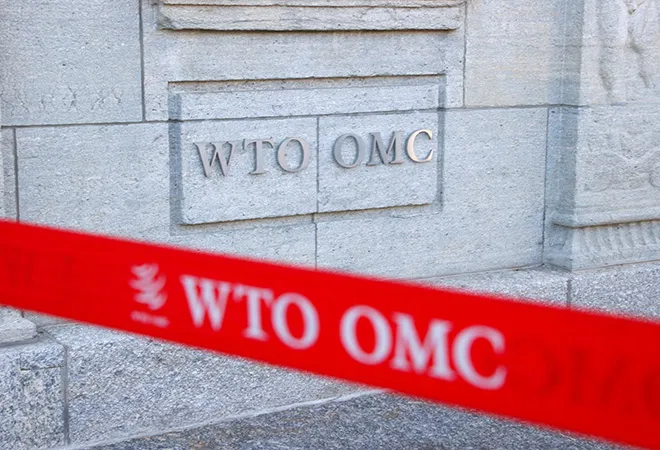-
CENTRES
Progammes & Centres
Location

In 1995, the World Trade Organization (WTO) was created with a commitment by sovereign states to entrust an authoritative institution to relay decisions on the conduct of its members. This commitment is increasingly being challenged for two reasons. First, members are reacting to inconsistent WTO conduct by imposing countermeasures on unsubstantiated justifications. Second, because of unanswered grievances, the United States has blocked appointments of new members to the Appellate Body. Thus, the WTO regime—which has governed trade relations among the world’s largest economies—is now under threat; reeling back to a unilateral Westphalian order.
With the fragmentation of the WTO regime considering the 2018 trade wars, members that want to preserve the old economic order will be faced with a paradox: overriding the US’ non-consensual procedures in contrast with a decision by consensus. Without an authoritarian institution within the WTO, the liberal economic order will devolve into a deinstitutionalised dispute. However, one must also keep in mind that the United States has been an outlier and has refrained from signing many international agreements for the past 20-30 years, making arbitration difficult.
Thus, while the WTO has recently failed in providing mediation in the ongoing trade wars, one cannot simply argue that the organisation has not protected the liberal order without first taking into account its successes. International pacts such as the COP24 and the UN Migration Pact have been signed by many countries in recent years despite the shifts to a protectionist mindset.
Without an authoritarian institution within the WTO, the liberal economic order will devolve into a deinstitutionalised dispute. However, one must also keep in mind that the United States has been long an outlier and has refrained from signing many international agreements for the past 20-30 years, making arbitration difficult.
The multilateral trading system is an institutions-based regime, wherein members commit to a set of utilitarian rules but also refrain from unilaterally interpreting and reacting to the conduct of other members. This institutionalised regime established by the WTO based on central decision-making, is both weak—as it operates on a Westphalian international order—and strong, at the same time, because there are rules of conduct that guide members’ interactions within the trade regime and a forum to negotiate changes.
Public policy seems to be adapting at a slow pace to the changes in globalisation and technological disruption because of the localisation of politics that has created inequality and unhappiness. The politics of economics generally plays a bigger hand in this inequality when you decide to regulate one group over the other and whether you choose prescriptive regulation over principal-based regulation. That is why every country is now looking inwards to see if they can assuage the problems independently.
To counter this, non-state actors must participate, as they are often affected by trade restrictions and WTO inconsistent policies. They act as resource enhancers to defend their strategic interests in times of changing trade policies. However, even with increased efforts from governments towards democratising trade policy development, there are hindrances with the emergence of other Westphalian ideologies. An effective public-private collaboration seems essential yet complex as their respective interests do not always align.
The WTO regime went further than any other global legal regime in institutionalising relations between sovereigns, necessitating resort to authoritative institutions, and prohibiting unilateral action. However, under this order lies the base of the Westphalian regime in which states retain control over economic and military resources and therefore have the de facto power to decide on how to respond to a perceived violation. For instance, climate change and food security may be issues of common ground amongst the sovereign states, but the issue of intellectual property rights is not. Such a debate could bring us into a Westphalian trap as no sovereign state will be able to call upon an institution to make a non-partisan authoritative decision. To overcome this Westphalian trap, we require a well-functioning legal mechanism, along with a deeper commitment to settle disputes by resorting to a centralised institution. There needs to be accountability through nation states and their citizens.
“The liberal international economic order is based on the western philosophy of capitalism with a small margin for social development.”
The liberal international economic order is based on the western philosophy of capitalism with a small margin for social development. India can play a big role in proposing an order based on capitalism and social welfare in other developed and developing economies. With the rise in populism, it is evident that something is wrong in the effectiveness of the WTO and we need to make it more adaptable and inclusive.
The Westphalian system was a deinstitutionalised system wherein some states were seeded a disproportionate say of rights to control the rules of trade. This engagement of states in damaging conduct and self-interested action is indistinguishable from a power-based struggle. As the WTO and its functioning slowly retract to the old Westphalian ways, we are forced to question how we can reform the system that has created problems from within. If we look to reform, we would be perpetuating the same disparities and power relations which must be avoided. Therefore, we need to look beyond reform, beyond the Club of the West, towards reorder and reimagination of the economic order.
This essay originally appeared in Raisina Dialogue Conference Report 2019
The views expressed above belong to the author(s). ORF research and analyses now available on Telegram! Click here to access our curated content — blogs, longforms and interviews.

Ruchbah was a Research Assistant at ORF under the Economy and Development Programme. Her current areas of interest lie in the political economy of institutions ...
Read More +